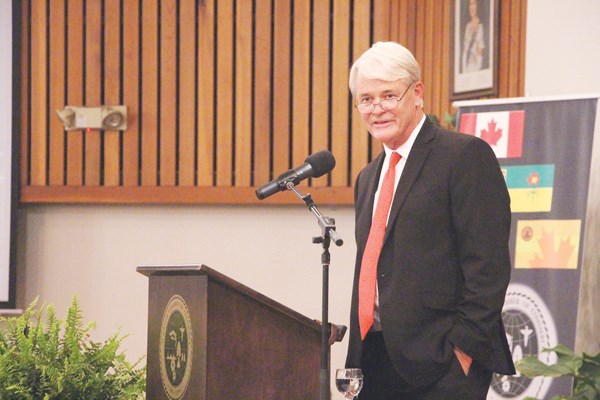Businesses are like animals; the ones who can adapt can survive, while the ones who can’t are faced with extinction. Michael Campbell, host of Money Talks, spoke at the Yorkton Chamber of Commerce Business Dinner, telling businesses of the big changes coming down the pipe and how they’re going to have to adapt in order to keep up with the times.
It’s not merely that times are changing, Campbell says, but that people aren’t changing with it, and adapting to make their businesses work with the change that surrounds them.
“The challenge for people with change is not just the intensity of it, but they don’t recognize it. They’re uncomfortable with that rate of change, but yet when they look around, they’re driving it. They don’t apply it to themselves and their own business at that point.”
He points to increased automation, such as with self-checkout or self-serve gas stations, or new stores like the one Amazon is trying to set up that don’t require checkout staff. Eventually, completely automated transportation could spell an end to traditional couriers.
“My biggest worry about the rate of change is that certain industries are going to be obliterated by technological change. Number one for me is I’m worried about people in the delivery business. Trucking is going to change dramatically, taxis are going to change dramatically with the advent of self-driving cars. We’re seeing manufacturing, that’s what the loss has been in the manufacturing sector that Donald Trump talks about enough. It isn’t Mexico, it’s technological change. We have seen it before in history, but this time it is happening at a rate that is the most intense in history.”
One of Campbell’s answers to that challenge is changes to the education system, things such as having classes in programming and ensuring that kids are not technologically illiterate.
“Otherwise we are going to create an absolute, permanent underclass of people who are unemployable.”
The biggest challenge is going to be the aging population, as people live longer and, more importantly, are retired for longer, and pension funds have to continue to pay out.
“The biggest social change is going to come out of the pension problems you’re going to see in the US and you’re going to see in Europe. In Canada, you’re going to see it as a huge drain on public finances that will squeeze out other spending, at the same time every provincial government has a challenge with healthcare spending, new technological change and the aging population.”
The other challenge facing businesses involves taxes. Joking that, much like a bank robber, government will go after business tax “because that’s where the money is,” Campbell says that he is concerned that the tax increase will be short-sighted, as governments should also be encouraging growth.
“The name of the game is raising money for governments, because they think they need it.”
The overall message is that we have to adapt, and if we don’t people are going to be left behind, and Campbell worries that there will be people permanently unemployed because of a failure to adapt.
“Whether we do well or we don’t do well is going to be our attitudes towards change, whether it’s an individual business or whether it’s a country. My challenge is that governments specialize in the status quo, they don’t specialize in looking forward and moving forward. That’s going to be the big challenge when we talk about government finances.”




